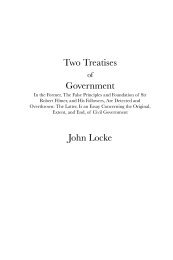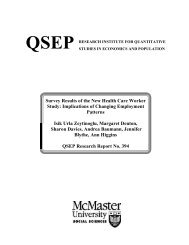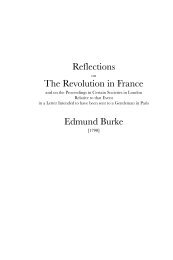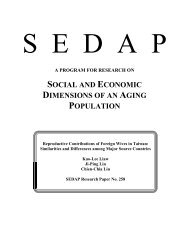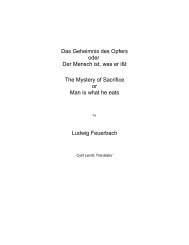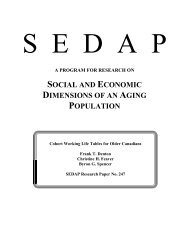AGRICULTUREher work, but generosity in meat and drink has alwaysbeen characteristic <strong>of</strong> the English farmer, and duringthe hungry years <strong>of</strong> adolescence the average girl whowas a servant in husbandry was amply nourished. Thencame marriage. The more provident waited long inthe hope <strong>of</strong> securing independence, and one <strong>of</strong> thosedesirable cottages with four acres <strong>of</strong> land, but tosome the prospect seemed endless and at last theymarried hoping something would turn up ; or perhapsthey were carried away by natural impulses andmarried young without any thought for the future.Such folly was the despair <strong>of</strong> Churchwardens andOverseers, yet the folly need not seem so surprisingwhen we consider that delay brought the youngpeople no assurance <strong>of</strong> improvement in their position.Church and State alike taught that it was the duty<strong>of</strong> men and <strong>women</strong> to marry and bring forth children,and if for a large class the organisation <strong>of</strong> Societymade it impossible for them to rear their children,who is to blame for the fate <strong>of</strong> those children, theirparents or the community ?After one <strong>of</strong> these imprudent marriages the husbandsometimes continued to work on a farm as a servant,visiting his wife and children on Sundays and holidays.By this means he, at least, was well fed and wellhoused. The woman with a baby to care for andfeed, could not leave her home every day to work andmust share the children's food. In consequenceshe soon began to practise starvation. Her settlementwas disputed, and therefore her dwelling wasprecarious. Nominally she was transferred on marriageto the parish where her husband was bound as servantfor the term <strong>of</strong> one year, but the parish objected tothe settlement <strong>of</strong> a married man lest his childrenbecame a burden on them.No one doubted that it was somebody's duty tocare for the poor, but arrangements for relief werestrictly parochial and the fear <strong>of</strong> incurring unlimitedAGRICULTUREfuture responsibilities led English parishioners tostrange lengths <strong>of</strong> cruelty and callousness. The factthat a woman was soon to have a baby, instead <strong>of</strong>appealing to their chivalry, seemed to them the bestreason for turning her out <strong>of</strong> her house and driving herfrom the village, even when a hedge was her onlyrefuge.The once lusty young woman who had formerly donea hard day's work with the men at harvesting wasbroken by this <strong>life</strong>. It is said <strong>of</strong> an army that it fightsupon its stomach. These <strong>women</strong> faced the grimbattle <strong>of</strong> <strong>life</strong>, laden with the heavy burden <strong>of</strong> childbearing,seldom knowing what it meant to haveenough to eat. Is it surprising that courage <strong>of</strong>tenfailed and they sank into the spiritless, dismal ranks<strong>of</strong> miserable beings met in the pages <strong>of</strong> Quarter SessionsRecords, who are constantly being forwarded fromone parish to another.Such <strong>women</strong>, enfeebled in mind and body, could nothope to earn more than the twopence a day and theirfood which is assessed as the maximum rate for <strong>women</strong>workers in the hay harvest. On the contrary, judgingfrom the account books <strong>of</strong> the period, they <strong>of</strong>tenreceived only one penny a day for their labour. Significant<strong>of</strong> their feebleness is the Norfolk assessmentwhich reads, " Women and such impotent personsthat weed corne, or other such like Labourers 2d withmeate and drinke, 6d without."' Such wages mayhave sufficed for the infirm and old, but they meantstarvation for the woman with a young family dependingon her for food. And what chance<strong>of</strong> health andvirtue existed for the children <strong>of</strong> these enfeebledstarving <strong>women</strong> ?On the death or desertion <strong>of</strong> her husband thelabouring woman became wholly dependent on theParish for support.-----p-' Eng Hzst Rev, Vol XIII , p 52289
AGRICULTUREThe conduct <strong>of</strong> the magistrates in fixing maximumwages at a rate which they knew to be below subsistencelevel seems inexplicable ; is in fact inexplicableuntil it is understood that these wages were neverintended to be sufficient for the support <strong>of</strong> a family.Statute 31 Eliz. and others, show that the wholeinfluence <strong>of</strong> the Government and administration wasdirected to prevent the creation <strong>of</strong> a class <strong>of</strong> wage-earners.It was an essential feature <strong>of</strong> Tudor policy to fosterthe Yeomanry, from whose ranks were recruited thedefenders <strong>of</strong> the realm.Husbandmen were recog-nised as " the body and stay " <strong>of</strong> the kingdom.' Theymade the best infantry when bred " not in a servileor indigent fashion, but in some free and plentifulmanner."2 If the depopulation <strong>of</strong> the country-sidewent on unchecked, there would come to pass " amere sollitude and vtter desolation to the whole Realme,furnished only with shepe and shepherdes instead <strong>of</strong>good men ; wheareby it might be a prey to oureenymies that first would sett vppon it."3Probably the consideration <strong>of</strong> whether a familycould be fed by a labourer's wage, seldom entered theJustices' heads. They wished the family to win itsfood from a cr<strong>of</strong>t and regarded the wages as merelysupplementary. The Justices would like to haveexterminated wage-earners, who were an undesirableclass in the community, and they might have succeededas the conditions imposed upon the <strong>women</strong> madethe rearing <strong>of</strong> children almost impossible, had noteconomic forces constantly recruited the ranks <strong>of</strong>wage-earners from the class above them.The demands <strong>of</strong> capital however for labour alreadyexceeded the supply available from the ranks <strong>of</strong>husbandmen, and could only be met by the establish-' Lipson, Economic Hist. <strong>of</strong> England, p. 153.'Bacon, Works, Vol. VI., p. 95.a Lamond (Eliz.) Discottrse <strong>of</strong> the Common weal, 1581.AGRICULTUREment <strong>of</strong> a class <strong>of</strong> persons depending wholly on wages.The strangest feature <strong>of</strong> the situation was the fact thatthe magistrates who were trying to exterminate wageearnerswere <strong>of</strong>ten themselves capitalists creating thedemand.The actual proportion <strong>of</strong> wage-earners in the<strong>seventeenth</strong> <strong>century</strong> can only be guessed at. Thestatement <strong>of</strong> a contemporary1 that Labourers andCottagers numbered z,oo3,ooo persons, out <strong>of</strong> a population<strong>of</strong> only ~,ooo,ooo must be regarded as anexaggeration ; in any case their distribution was uneven.Complaints are not infrequently brought beforeQuarter Sessions from parishes which say they areburdened with so great a charge <strong>of</strong> poor that they cannotsupport it ; to other parishes the Justices are sometimesdriven to issue orders on the lines <strong>of</strong> a warrantcommanding " the Churchwardens <strong>of</strong> the townes <strong>of</strong>Screwton and Aynderby to be more diligent in relievingtheir poore, that the court be not troubled with anyfurther claymours therein."2On the other hand there were many districts wherethe wage earner was hardly known and the authorities,like the Tithing men <strong>of</strong> Fisherton Delamere couldreport that they " have (thanks to the Almighty Godtheirfor) no popish recusants ; no occasion to levytwelvepence, for none for bear to repair to divine service;no inns or alehouses licensed or unlicensed, no drunkenperson, no unlawful weights or measures, no neglect <strong>of</strong>hues and cries, no roads out <strong>of</strong> repair, no wanderingrogues or idle persons, and no inmates <strong>of</strong> whom theydesire inf~rmation."~ Or the Constable <strong>of</strong> Tredingtonwho declared that " the poor are weekly relieved, felonsnone known. Recusants one Bridget Lyne, the' Grasicr's Complaint, p. 60.Torks. N.R. Q.S. Rcc., Vol. I., p. 22-3, 1605.Hist. MSS. Com.Var. Coll.,Vol. I., p, 93. Wilts Q.S. Rec., 1621. A similar detailedreturn war made from the Hundred <strong>of</strong> Wilton in 1691. Many <strong>of</strong>ten return ' omni?bene ' and the like in brief.
- Page 1 and 2: WORKING LIFE OF WOMENIN THESEVENTEE
- Page 3 and 4: PREFACEboth can be studied in the w
- Page 5 and 6: 2 INTRODUCTORY INTRODUCTORY 3is det
- Page 7 and 8: INTRODUCTORYThese circumstances hav
- Page 9 and 10: 10 INTRODUCTORY INTRODUCTORYthis pe
- Page 11 and 12: CAPITALISTSTerm includes aristocrac
- Page 13 and 14: CAPITALISTSA granddaughter of Olive
- Page 15 and 16: CAPITALISTSsuch as noe way entangle
- Page 17 and 18: 26 CAPITALISTS CAPITALISTS 27Wellin
- Page 19 and 20: 30 CAPITALISTS CAPITALISTS 3'years
- Page 21 and 22: CAPITALISTSboth, so that there coul
- Page 23 and 24: 38 CAPITALISTShis Lady was taking d
- Page 25 and 26: AGRICULTURE 43AGRICULTUREAgricultur
- Page 27 and 28: AGRICULTURE AGRICULTURE 47two Weeks
- Page 29 and 30: AGRICULTUREFitzherbert's descriptio
- Page 31 and 32: 54 AGRICULTUREamong the gentry. The
- Page 33 and 34: 5 8 AGRICULTURE AGRICULTURE 59was u
- Page 35 and 36: 62 AGRICULTURE AGRICULTURE 63" Spre
- Page 37 and 38: AGRICULTUREthe same work,' a marrie
- Page 39 and 40: AGRICULTUREThe Justices in the Nort
- Page 41 and 42: AGRICULTUREIn some places the labou
- Page 43 and 44: AGRICULTURELabourers naturally were
- Page 45 and 46: 82 AGRICULTURE AGRICULTUREdenyed a
- Page 47: AGRICULTUREpayne of xs a weeke and
- Page 51 and 52: 94 TEXTILES TEXTILESIt requires som
- Page 53 and 54: TEXTILESchildren were said to be em
- Page 55 and 56: TEXTILES TEXTILES 103respect obtain
- Page 57 and 58: TEXTILES TEXTILES'07people who had
- Page 59 and 60: I 10 TEXTILES TEXTILES I111693 to p
- Page 61 and 62: I 14 TEXTILES TEXTILES 115books,' b
- Page 63 and 64: 118 TEXTILES TEXTILES 119money in p
- Page 65 and 66: 122 TEXTILES TEXTILES 123clothing w
- Page 67 and 68: 126 TEXTILES TEXTILESclosely imitat
- Page 69 and 70: 1 30TEXTILESspinsters' maximum wage
- Page 71 and 72: TEXTILESa mownte in the yere t o jM
- Page 73 and 74: '38 TEXTILES TEXTILESD. Silk, and G
- Page 75 and 76: 142TEXTILES TEXTILES '43end. And it
- Page 77 and 78: TEXTILESbranches of the woollen ind
- Page 79 and 80: CRAFTS AND TRADESCHAPTER V.--CRAFTS
- Page 81 and 82: CRAFTS AND TRADES CRAFTS AND TRADES
- Page 83 and 84: I 58CRAFTS AND TRADESwith the wife
- Page 85 and 86: CRAFTS AND TRADES CRAFTS AND TRADES
- Page 87 and 88: CRAFTS AND TRADES. . . . shall teac
- Page 89 and 90: I 70 CRAFTS AND TRADES CRAFTS AND T
- Page 91 and 92: CRAFTS AND TRADESone month the Mast
- Page 93 and 94: 178 CRAFTS AND TRADES CRAFTS AND TR
- Page 95 and 96: 182 CRAFTS AND TRADES CRAFTS AND TR
- Page 98 and 99:
I 88 CRAFTS AND TRADES CRAFTS AND T
- Page 100 and 101:
192 CRAFTS AND TRADESIn the unprote
- Page 102 and 103:
CRAFTS AND TRADESand eleven sisters
- Page 104 and 105:
200 CRAFTS AND TRADES CRAFTS AND TR
- Page 106 and 107:
CRAFTS AND TRADES CRAFTS AND TRADES
- Page 108 and 109:
CRAFTS AND TRADESBut if a woman be
- Page 110:
2 12 CRAFTS AND TRADES CRAFTS AND T
- Page 114 and 115:
CRAFTS AND TRADES CRAFTS AND TRADES
- Page 116 and 117:
CRAFTS AND TRADESalso defended as a
- Page 120 and 121:
CRAFTS AND TRADESfrom her fellow pa
- Page 122 and 123:
PROFESSIONS 237PROFESSIONSIntroduct
- Page 124 and 125:
24O PROFESSIONS PROFESSIONStheir Th
- Page 126 and 127:
244 PROFESSIONS PROFESSIONS 245the
- Page 128 and 129:
PROFESSIONS PROFESSIONS 249profanat
- Page 130 and 131:
252PROFESSIONSGiles Moore enters in
- Page 132 and 133:
PROFESSIONScribed as one who " dist
- Page 134 and 135:
PROFESSIONS PROFESSIONS 261first ma
- Page 136 and 137:
264 PROFESSIONSGarrett's leg shall
- Page 138 and 139:
268 PROFESSIONSwhere there are none
- Page 140 and 141:
PROFESSIONS PROFESSIONS 273the numb
- Page 142 and 143:
PROFESSIONSexaminations, before six
- Page 144 and 145:
PROFESSIONS PROFESSIONS 281death me
- Page 146 and 147:
284 PROFESSIONS PROFESSIONSof confi
- Page 148 and 149:
288 PROFESSIONSextent they were whe
- Page 150 and 151:
CONCLUSIONor in her other facilitie
- Page 152 and 153:
CONCLUSION CONCLUSION 297in women's
- Page 154 and 155:
CONCLUSIONlaw of Nature, inviolable
- Page 156 and 157:
CONCLUSIONwere specially deprecated
- Page 158 and 159:
308 CONCLUSIONof the State, and the
- Page 160 and 161:
312 AUTHORITIES AUTHORITIES 313Cost
- Page 162 and 163:
AUTHORITIESMartindale, Adam, The Li
- Page 164 and 165:
County.Buckingham ..Cardigan .. ..C
- Page 166 and 167:
INDEXINDEXFlax, 64, 146, 246, 291 ;
- Page 168:
INDEXsmants, women( 50,65,157 ; mam



